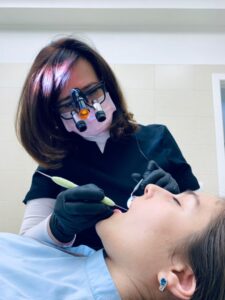Bruxism is characterized by jaw clenching or teeth grinding. About 17% of children are said to experience sleep bruxism, but this number gradually increases as people age. There are several issues this bad habit can cause, temporomandibular joint (TMJ) disorder being one painful consequence.
Most cases of bruxism can be fixed without any invasive dental treatments. This blog discusses the symptoms and problems associated with teeth grinding and TMJ disorders and how one can fix them with professional assistance.
Identifying Bruxism And TMJ Problems
When bruxism contractions are too strong, they result in various TMJ problems. Severe bruxism is also known to interrupt sleep, and loud sounds may also disturb people around you. The exact reason for this phenomenon is unknown, but studies have drawn a connection with genetics, stress, and medication.
If you find yourself grinding your teeth every day or several times a day, you might need to see a dentist for your problem.
Let’s look at some common symptoms of bruxism that may lead to TMJ disorders:
- Toothache due to constant rubbing of teeth surfaces
- Mouth or facial pain, especially on the sides of the face
- Damaged or worn out teeth and teeth edges
- Headaches
- Sore gums and jaw muscles, especially in the morning
- Jaw muscle pain due to jaw locks
- Constricted jaw movement or biting
- Clocking or popping sounds as you open and close your mouth
- Flat chewing surfaces may also expose softer layers of the teeth
- A ringing sound in the ears

Non-surgical Bruxism and TMJ Treatment
People with bruxism and TMJ disorders can opt for non-surgical treatments to align the TMJ again. Night mouth guards are a great tool to minimize the damage caused by teeth grinding. Similarly, here are a few other alternatives to treat TMJ non-surgically.
1. Jaw exercises
When you visit your dentist, ask about relaxing jaw exercises to relieve your pain. This will help you relieve some stress related to TMJ disorder.
2. Tooth reconstruction procedure
When severe bruxism leads to collapsed biting, enamel wear and tear, and missing teeth, tooth construction can help salvage the jaw and remaining teeth. Teeth reconstruction is a non-invasive procedure to restore teeth shape, size, and height to align the jaw. This restorative procedure relieves TMJ pain and leaves patients with a new, beautiful smile.
3. Invisalign aligners
Tooth crowding or misalignment can be treated with Invisalign aligners.
Bruxism is common in little kids but may lead to TMJ issues that can cause severe damage to the teeth and gums. There are several treatments you can opt for to fix issues caused by teeth grinding, including facial exercises, tooth reconstruction, and aligners.
Talk to your dentist about possible non-surgical recovery treatments before jumping into any invasive procedures.
Your Professional Bruxism and TMJ Disorder Fix!
If you are experiencing TMJ issues, we are here for you! At West Hills Smiles, our team of professional dental care specialists works around the clock to provide you with quality services. We offer general and Cosmetic Dental Services West Hills and also have a team of Emergency Dentist Woodland Hills for urgent cases.
You can contact us to book an appointment or learn more about Bruxism and TMJ Disorders before your visit.




